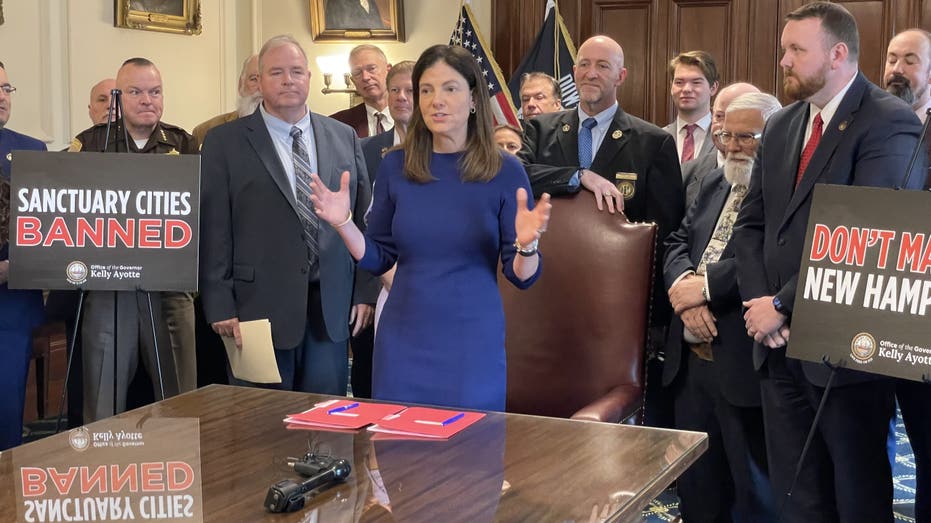Doctors threaten strike action after 4% pay offer







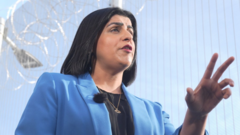


In a speech Thursday in North Carolina to soldiers of the 82nd Airborne Division, Secretary of Defense Pete Hegseth pledged to restore what he called the U.S. military’s "warrior ethos" and announced pay raises for paratroopers.
Speaking during All American Week at Fort Bragg, Hegseth laid out President Donald Trump's vision focused on combat readiness, merit-based standards, and investment in the American warfighter.
"We’re going to bring it back to the basics," Hegseth said. "We’re going to restore the warrior ethos… and we are across our formations, a standard that’s set here every single day."
According to the Department of Defense, Hegseth used the occasion to announce an increase in hazardous duty incentive pay, known as jump pay. It will rise from $150 to $200 per month for paratroopers, and for the first time, jumpmasters will receive an additional $150 on top of their existing pay.
"For the first time in 25 years… we are increasing jump pay," Hegseth said. "Not only are we increasing jump pay, but… jumpmasters… are going to receive an additional $150 a month in incentive pay."
He added: "Here’s to our paratroopers, our jumpmasters, who do the difficult things in difficult places that most Americans can never imagine."
Hegseth told the crowd that troops remain the focus of every major Pentagon decision.
"Inside the corridors of the Pentagon, you are on our minds, with the decisions we make in budgets, in planning, in deployments, in orders, in reorganizations. We have you and your families in mind."
In his remarks, Hegseth shared a core defense strategy promoted by Trump: prioritize readiness, reject identity politics, and reassert American deterrence.
"We will focus on readiness, on training, on warfighting, on accountability, on standards. Black, white, male, female, doesn’t matter. We’re going to be colorblind and merit-based warfighters just like you are here in the 82nd."
This return to fundamentals, Hegseth argued is necessary to rebuild the force and deter growing global threats.
"President Trump is committed to historic investments inside our formations. Our promise to you is that when the 82nd Airborne is deployed… you will be equipped better than any other fighting force in the world."
Drawing a contrast with prior administrations, Hegseth referenced global instability, including the war in Ukraine, the Oct. 7 terrorist attack on Israel, and the U.S. withdrawal from Afghanistan.
"Unfortunately, for a number of years, the world watched and wondered where American leadership and American strength was," he said. "By putting America first, we will reestablish peace through strength."
Hegseth closed by honoring the legacy and future of the 82nd.
CLICK HERE TO GET THE FOX NEWS APP
"Like those who came before you, you keep showing the world the stuff you’re made of. Because we know you are ready for the important work that lies ahead."
The Army office of Public Affairs did not immediately return Fox News Digital's request for comment.
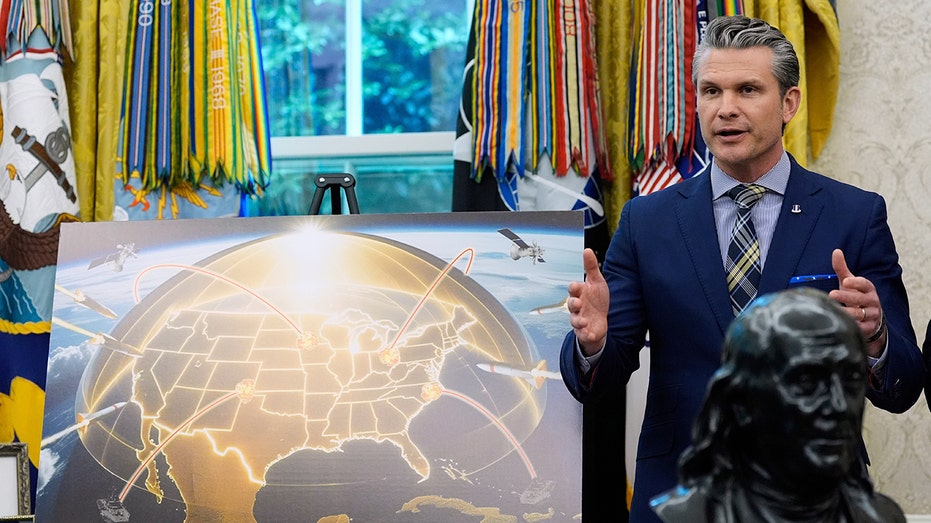
The Supreme Court upheld President Donald Trump’s removal of two Democratic appointees from federal boards, handing the administration a legal victory and settling a high-stakes dispute over the president's power to fire agency officials.
The Thursday ruling comes after Supreme Court Chief Justice John Roberts agreed to temporarily halt the reinstatement of National Labor Relations Board (NLRB) member Gwynne Wilcox and Merit Systems Protection Board (MSPB) member Cathy Harris, two Democrat appointees who were abruptly terminated by the Trump administration this year.
Both had challenged their terminations as "unlawful" in separate lawsuits filed in D.C. federal court.
However, the high court suggested that it could block attempts to fire Federal Reserve Chair Jerome Powell, who, according to Trump, has complained has not cut interest rates fast enough.
APPEALS COURT BLOCKS TRUMP FROM FIRING FEDERAL BOARD MEMBERS, TEES UP SUPREME COURT FIGHT
The issue confronting the justices was whether the board members, both appointed by President Joe Biden, can stay in their jobs while the larger fight continues over what to do with a 90-year-old Supreme Court decision known as Humphrey’s Executor, in which the court unanimously ruled that presidents cannot fire independent board members without cause.
The court’s three liberal justices dissented.
"Not since the 1950s (or even before) has a President, without a legitimate reason, tried to remove an officer from a classic independent agency," Justice Elena Kagan wrote, joined by Justices Sonia Sotomayor and Ketanji Brown Jackson.
Kagan wrote that her colleagues were telegraphing what would happen.
"The impatience to get on with things—to now hand the President the most unitary, meaning also the most subservient, administration since Herbert Hoover (and maybe ever)—must reveal how that eventual decision will go," she wrote.
Lawyers for the Trump administration urged the Supreme Court to either keep Wilcox and Harris off the job while the case moves through the lower courts, or to resolve the issue directly. They asked the justices to grant certiorari before judgment – a fast-track procedure the court uses occasionally to bypass the appeals process in cases of significant national importance.
They urged that Wilcox and Harris not be reinstated to their positions, arguing in their reply brief that the "costs of such reinstatements are immense."
They argued that keeping both Wilcox and Harris in place would "entrust" the president's powers "for the months or years that it could take the courts to resolve this litigation," something they said "would manifestly cause irreparable harm to the President and to the separation of powers."
"The President would lose control of critical parts of the Executive Branch for a significant portion of his term, and he would likely have to spend further months voiding actions taken by improperly reinstated agency leaders."
Earlier this month, the U.S. Court of Appeals for the D.C. Circuit voted 7–4 to restore Wilcox and Harris to their respective boards, citing Supreme Court precedent in Humphrey’s Executor v. United States and Wiener v. United States – landmark rulings that upheld limits on the president’s power to remove members of independent federal agencies.
The majority noted that the Supreme Court has never overturned the decades-old precedent upholding removal protections for members of independent, multimember adjudicatory boards – such as the NLRB and MSPB – and said that precedent supported reinstating Wilcox and Harris.
It also rejected the Trump administration's request for an administrative stay, which would have allowed their removals to remain in place while the challenge proceeds in court.
"The Supreme Court has repeatedly told the courts of appeals to follow extant Supreme Court precedent unless and until that Court itself changes it or overturns it," judges noted in their opinion.
The ruling would have temporarily returned Harris and Wilcox to their posts – but the victory was short-lived. The Trump administration quickly appealed to the Supreme Court, which granted an emergency administrative stay blocking their reinstatement.
In their own Supreme Court filings, lawyers for Wilcox and Harris argued that the court should reinstate them to their roles on their respective boards until a federal appeals court can consider the matter.
APPEALS COURT BLOCKS TRUMP ADMIN'S DEPORTATION FLIGHTS IN ALIEN ENEMIES ACT IMMIGRATION SUIT
Both Wilcox and Harris opposed the administration’s effort to fast-track the case, warning against skipping the normal appeals process and rushing arguments. "Rushing such important matters risks making mistakes and destabilizing other areas of the law," Harris’s lawyers told the Supreme Court this week.
Wilcox, the NLRB member, echoed this argument in her own brief to the high court.
Counsel for Wilcox cited the potential harm in removing her from the three-member NLRB panel – which they argued in their filing could bring "an immediate and indefinite halt to the NLRB’s critical work of adjudicating labor-relations disputes."
"The President’s choice to instead remove Ms. Wilcox does not bring the Board closer in line with his preferred policies; it prevents the agency from carrying out its congressionally mandated duties at all," they said.
Harris and Wilcox's cases are among several legal challenges attempting to clearly define the executive's power.
Hampton Dellinger, a Biden appointee previously tapped to head the Office of Special Counsel, sued the Trump administration over his termination. Dellinger filed suit in D.C. district court after his Feb. 7 firing.
He had maintained the argument that, by law, he could only be dismissed from his position for job performance problems, which were not cited in an email dismissing him from his post.
Dellinger dropped his suit against the administration after the D.C. appellate court issued an unsigned order siding with the Trump administration.
The Justice Department, for its part, said in February a letter to Sen. Dick Durbin, D-Ill., that it was seeking to overturn Humphrey's Executor.
The Associated Press contributed to this report.
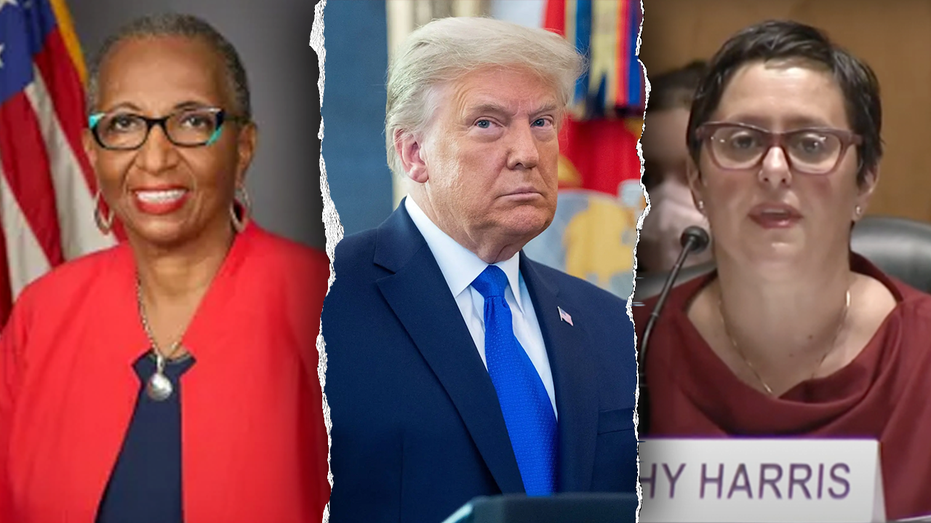
Far-left progressive billionaire Alex Soros is being slammed online for his statement condemning the killing of two Israeli embassy staffers despite funding anti-Israel groups through his Open Society Foundation (OSF).
Soros, who is the son and heir to George Soros’ fortune and philanthropic empire, condemned the killings in an X post, saying "the murder of Sarah Milgrim and Yaron Lischinsky at the Capital Jewish Museum was evil in its most basic form" and that "this brutal antisemitic act must be condemned in the strongest terms."
Milgrim and Lischinsky, two Israeli Embassy staffers who were set to be engaged, were killed outside an event at the Capital Jewish Museum in Washington, D.C., on Wednesday night.
D.C. police identified the suspect as 30-year-old Elias Rodriguez, who was taken into custody after the shooting attack. He was allegedly seen pacing outside the museum before he approached a group of four people, including the two victims, and opened fire. Rodriguez then reportedly went into the museum, where he was detained by security. He allegedly shouted "Free, free Palestine!" while in custody.
OMAR WALKS AWAY FROM REPORTERS ASKING ABOUT ISRAELI EMBASSY STAFFERS KILLED IN DC
Though Soros condemned the killings, his statement was flooded with replies calling out his funding of radical anti-Israel groups that foment anti-Jewish sentiments.
"Alex, you and your father created this problem through the ruthless and international silencing of critics to open borders policies," said one X user named Joseph Janecka. "Their blood is on your hands as much as their murderers. We will never forget."
Carl Wheless, another user, commented, "You are behind the hate, so excuse us if you don't wish to hear from you on the matter."
Another, Eitan Fischberger, asserted that Soros "funds the revolutionary Marxist group the shooter belonged to."
YOUNG COUPLE FATALLY SHOT OUTSIDE JEWISH EVENT IN DC WERE ABOUT TO GET ENGAGED
Though the details of Rodriguez’s affiliations are currently unclear as chair of OSF, Soros has helped to fund several leftist groups that have accused Israel of genocide and called for the end of the Jewish state.
In 2023, Israel's minister of diaspora affairs and social equality, Amichai Chikli, told Fox News Digital that Soros is a mirror image of father George’s anti-Israel agenda.
When asked if Soros would continue to fund anti-Israel entities that bash the Jewish state, Chikli said it "looks like the son is a replica of his father. We have no expectation that his son will be a big Zionist."
Chikli added that OSF funds Human Rights Watch, which he said, "is attacking Israelis heavily and attacking Israel as an apartheid state and delegitimizing and demonizing Israel."
PIRRO ANNOUNCES MURDER CHARGES AGAINST ALLEGED DC SHOOTER: ‘ANTISEMITISM WILL NOT BE TOLERATED’
He also said OSF funds "J Street," an organization that claims to be pro-Israel but has faced criticism because of its support for positions that allegedly favor Iran’s regime and the Palestinians.
Chikli also noted that the Soros foundation "gives money to radical small Palestinian organizations in Israel that describe Israel as a colonial state and a moral sin." He cited the NGO Adalah, which means "justice" in Arabic, as an organization "denying the vision of Israel as a Jewish state" in its "published vision for Arab society in Israel."
The elder Soros has also faced intense criticism from Israel’s ambassador to the U.N. for pumping over $15 million into a network of nongovernmental organizations that allegedly support Hamas.
"George Soros’ donations to organizations that seek the destruction of the State of Israel as a Jewish state is shameful. However, I am not surprised," Israeli ambassador Gilad Erdan told Fox News Digital in December 2023.
"For years, Soros has backed and transferred money to organizations supporting BDS that want to isolate Israel," added Erdan, who has been leading the diplomatic campaign at the U.N. to spell out Hamas’ crimes against humanity. "They have never been about real peace or any solution to the Israeli-Palestinian conflict."

Welcome to the Fox News Politics newsletter, with the latest updates on the Trump administration, Capitol Hill and more Fox News politics content. Here's what's happening…
The Department of Homeland Security (DHS) is eliminating the student visa program at Harvard University due to "pro-terrorist conduct" at campus protests, Fox News Digital has learned.
It's a severe consequence for what DHS claims is Harvard's refusal to comply with its requests for behavioral records of student visa holders.
"This administration is holding Harvard accountable for fostering violence, antisemitism, and coordinating with the Chinese Communist Party on its campus," said DHS Secretary Kristi Noem. "It is a privilege, not a right, for universities to enroll foreign students and benefit from their higher tuition payments to help pad their multibillion-dollar endowments. Harvard had plenty of opportunity to do the right thing. It refused. They have lost their Student and Exchange Visitor Program certification as a result of their failure to adhere to the law. Let this serve as a warning to all universities and academic institutions across the country."…READ MORE
GRADING TRUMP: Trump's 2nd-term approval ratings dip despite border security gains
YOU'RE NOT FIRED: Federal judge blocks Trump admin moves to dismantle Dept of Education
WHITE HOUSE WHITEWASH: New book exposes how top Biden comms staffer was 'tip of the spear' covering up Biden's cognitive decline
WORLD CLASS: First lady embarks on 'new frontier' in publishing with audiobook of memoir
FOREIGN TAKEOVER: New law would stop foreign adversaries from 'buying up our country' while Americans can't afford homes
HERE TO HELP: Red Cross fighting to reach hostages, alleviate 'catastrophic' situation in Gaza
'CHEATED' AMERICA: Republicans look to stop China's 'backdoor' tariff-dodging scheme
'A PRICE TO PAY': Democrats predict passing Trump's 'big, beautiful bill' will cost many Republicans their seats
BIG BILL, BIGGER DRAMA: Winners, losers, and grab-bags from House GOP’s narrow passage of ‘Big, Beautiful Bill’
'I'M GOING TO GO': Ilhan Omar refuses to answer reporter questions on fatal shooting of Israeli Embassy workers
NANCY VS NANCY: Mace sounds off on stock trading in Congress, Pelosi remains silent: ‘Something doesn’t add up’
BORDER BOLSTER: Bipartisan Senate bill targets border human, drug trafficking with innovative technology
'EVIL OF ANTISEMITISM': White House decries 'evil of antisemitism,' vows justice after fatal shooting of Israeli embassy staffers
NEW TACTIC: ICE begins new, nationwide effort to arrest illegal aliens at immigration hearings
SICKEST GENERATION: RFK Jr.'s highly-anticipated MAHA report paints dismal state of child health, national security concerns
SPLIT DECISION: Supreme Court upholds Oklahoma decision, in blow to religious charter schools
'DID THIS FOR GAZA': Who is the suspect in the killing of 2 Israeli embassy staffers?
HISTORY OF TERROR: Gunman kills Israeli embassy couple in Washington, following decades of embassy-targeted attacks
TERROR AT HOME: Antisemitic shooting of Israeli diplomats adds to alarming rise in domestic terrorism
ENFORCEMENT FIRST: This state just became the latest in the country to ban sanctuary cities
Get the latest updates on the Trump administration and Congress, exclusive interviews and more on FoxNews.com.

Department of Agriculture Secretary Brooke Rollins said during a Make America Healthy Again (MAHA) event Thursday that the Trump administration is making history with its approval of numerous waivers that will eliminate junk food from food stamp programs.
Rollins was in Nebraska on Monday to sign the first alongside Republican Gov. Jim Pillen. She has also signed a waiver for Indiana and Iowa, "with half-a-dozen more coming down the line," she said.
"We are on track to sign multiples of snap waivers to get junk food and sugary drinks out of our food stamp system," Rollins said at the Thursday afternoon event, centering around the release of a 69-page report from the Trump administration's MAHA Commission on how to effect change around childhood chronic disease.
HOUSE REPUBLICANS UNVEIL NEW FOOD STAMP WORK REQUIREMENTS FOR TRUMP'S 'BIG, BEAUTIFUL BILL'
"That has never happened before under Republican or Democrat administrations," Rollins added. "We have never made that happen before. So I am so proud and so grateful."
On average, 42 million low-income Americans receive food stamp assistance each month, according to the MAHA report released at Thursday's event. It added that 1 in 5 American children under 17 receive SNAP benefits.
With Nebraska's waiver, it became the first state in the nation to bar recipients of federal food stamp programs from using the money to buy junk food, soda and other high-sugar items. The exemption will begin as a two-year pilot program, local media reported.
REPUBLICAN BILLS PUT TAXPAYER-FUNDED JUNK FOOD ON THE CHOPPING BLOCK
Other GOP-led states, including Texas and West Virginia, have applied for this waiver.
"SNAP was created to increase access to nutritious food; however, many SNAP purchases are for food with little to no nutritious value," Texas GOP Governor Greg Abbott wrote in a letter to Rollins requesting a waiver last week.
"Under the Trump administration, for the first time since the program was authorized, states can take steps to eliminate the opportunity to buy junk food with SNAP benefits and assure that taxpayer dollars are used only to purchase healthy, nutritious food."
West Virginia's Governor Patrick Morrisey, one of the leaders requesting a waiver, has also been spearheading other MAHA efforts in his state. In March, Morrisey signed House Bill 2354 into law, which made it the first state in the nation to begin prohibiting certain synthetic dyes and additives used in food items sold in the state.
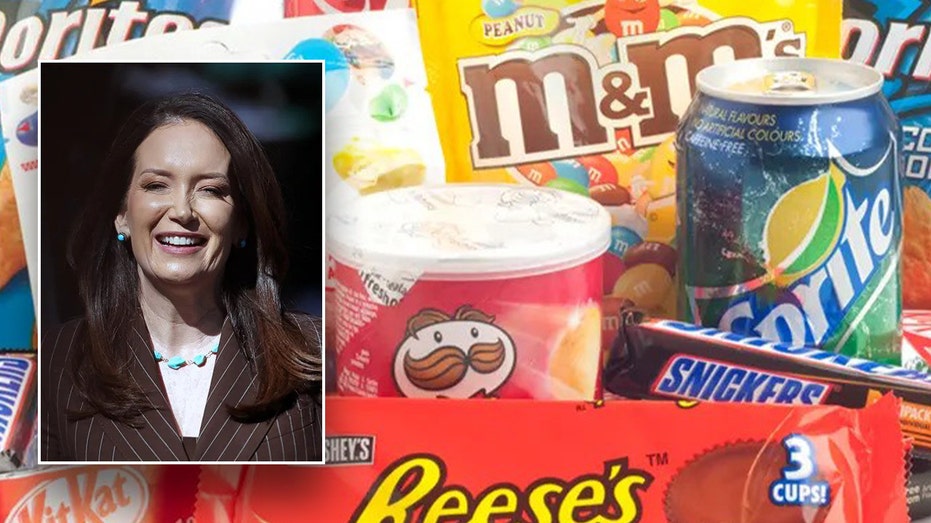
EXCLUSIVE: The Trump Department of Homeland Security is calling out a Biden-appointed "activist" judge in Massachusetts who paused the deportation of an illegal alien who DHS says sexually assaulted a disabled woman with the mental capacity of a 3-year-old.
The DHS shared a filing from the Nebraska Sex Offender Registry that says Burmese illegal Nyo Myint was convicted of attempted first-degree sexual assault of an individual incapable of consent.
DHS Assistant Secretary Tricia McLaughlin told Fox News Digital that Myint, who was living in Lincoln, Nebraska, sexually assaulted a 26-year-old woman "with the mental capacity of a 3-year-old."
"This ‘Lincoln man’ is an illegal alien and one of the monsters that the activist Massachusetts district judge is trying to bring back to the United States after he was deported yesterday," McLaughlin said.
IMMIGRATION EXPERT WARNS CHINESE ILLEGAL ALIENS USING CANADIAN CITY AS GATEWAY TO US
DHS has said Myint had a final order of removal issued against him Aug. 17, 2023.
U.S. District Judge Brian Murphy of Massachusetts issued the ruling Tuesday night, ordering President Donald Trump's administration to maintain custody of eight illegal immigrants deported to South Sudan in case he rules the removals unlawful and they must be transferred back to the U.S.
Murphy's ruling said the government must "maintain custody and control of class members currently being removed to South Sudan or to any other third country, to ensure the practical feasibility of return if the Court finds that such removals were unlawful."
After the ruling, McLaughlin called the decision "deranged," saying "these depraved individuals have all had their day in court and been given final deportation orders."
MOM OF GIRL ALLEGEDLY KILLED BY ILLEGALS SAYS WILDLIFE REFUGE RENAMING 'MEANS THE WORLD' TO FAMILY
"A reminder of who was on this plane: murderers, child rapists, an individual who raped a mentally and physically disabled person," McLaughlin added. "The message this activist judge is sending to victims and their families is we don’t care. President Trump and Secretary Noem are working every day to get vicious criminals out of our country while activist judges are fighting to bring them back onto American soil."
CLICK HERE FOR MORE IMMIGRATION COVERAGE
According to DHS, the other illegals on the plane were Enrique Arias-Hierro, a Cuban national convicted of homicide and other crimes; Jose Manuel Rodriguez-Quinones, another Cuban convicted of attempted first-degree murder with a weapon; Thongxay Nilakout, a citizen of Laos, convicted of first-degree murder and robbery; Jesus Munoz-Gutierrez, a Mexican national convicted of second-degree murder; Dian Peter Domach, a citizen of South Sudan convicted of robbery and possession of a firearm; Kyaw Mya, a citizen of Burma convicted of lascivious acts with a child victim less than 12 years of age; and Tuan Thanh Phan, a Vietnamese national convicted of first-degree murder.
The White House also issued a statement in response, saying the ruling is "another attempt by a far-left activist judge to dictate the foreign policy of the United States — and protect the violent criminal illegal immigrants President Donald J. Trump and his administration have removed from our streets."
ICE CAPTURES ILLEGAL IMMIGRANT WANTED FOR ALLEGEDLY KILLING MOTHER IN DUI CRASH
Trump chimed in on Truth Social, saying the ruling has forced the deportation flight to pause in Djibouti.
Trump slammed Murphy as "a Federal Judge in Boston, who knew absolutely nothing about the situation, or anything else," and "ordered that EIGHT of the most violent criminals on Earth curtail their journey to South Sudan."
The president urged the Supreme Court to end the trend of judges inhibiting his administration’s deportation agenda.
"The Judges are absolutely out of control, they’re hurting our Country, and they know nothing about particular situations, or what they are doing — And this must change, IMMEDIATELY!" he said. "Hopefully, the Supreme Court of the United States will put an END to the quagmire that has been caused by the Radical Left."
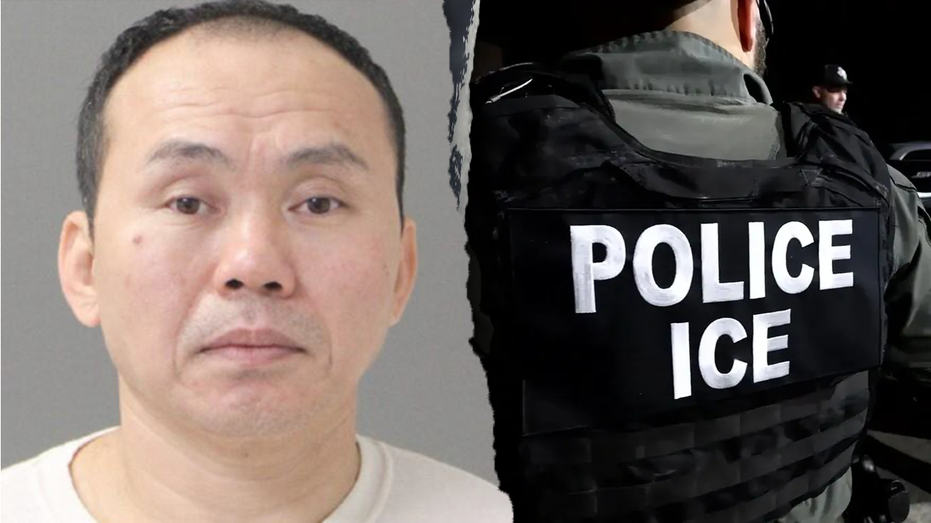


A former aide to Los Angeles Mayor Karen Bass who served as the deputy mayor of public safety has agreed to plead guilty to threatening to bomb City Hall last year, the Justice Department said Thursday.
Brian Williams, 61, of Pasadena, agreed to plead guilty to a single-count of "information with threats regarding fire and explosives", which carries a sentence of up to 10 years in prison.
"In an era of heated political rhetoric that has sometimes escalated into violence, we cannot allow public officials to make bomb threats," said U.S. Attorney Bill Essayli. "My office will continue its efforts to keep the public safe, including from those who violate their duty to uphold the law."
LA COUNTY DA NATHAN HOCHMAN PROMISES CRACKDOWN ON CRIMINALS: ‘THE FUN IS OVER’
The threat was carried out on Oct. 3, 2024 during a virtual meeting with Williams and others related to his duties, federal prosecutors said. During the call, Williams used the Google Voice application on his personal cellphone to place a call to his city-issued cellphone.
He then left the meeting and called the chief of staff of the Los Angeles Police Department, in which he falsely stated that he had just received a call on his city-issued cellphone from an unknown man who threatened to bomb Los Angeles City Hall.
Ten minutes after the call, Williams texted Bass and several high-ranking city officials in the mayor’s office and falsely reported, "Bomb threat: I received phone call on my city cell at 10:48 am this morning. The male caller stated that ‘he was tired of the city support of Israel, and he has decided to place a bomb in City Hall. It might be in the rotunda.’ I immediately contacted the chief of staff of LAPD, they are going to send a number of officers over to do a search of the building and to determine if anyone else received a threat."
Investigators determined that Williams never received a call and had made the bomb threat himself. Federal prosecutors noted that Williams never intended to carry out the threat.
The LAPD responded to City Hall to search for any suspicious devices. None were found, prosecutors said.
Williams described the threatening call he claimed to have received to police and showed them the record of an incoming call that appeared as a blocked number on his city-issued cellphone.
That incoming call record was the call Williams had placed to himself from the Google Voice application on his personal cellphone, investigators determined.
Williams then texted Bass and other city officials.
"At this time, there is no need for us to evacuate the building, I’m meeting with the threat management officers within the next 10 minutes," he allegedly wrote. "In light of the Jewish holidays, we are taking this thread a little more seriously. I will keep you posted."
"Mr. Williams, the former deputy mayor of Public Safety for Los Angeles, not only betrayed the residents of Los Angeles, but responding officers, and the integrity of the office itself, by fabricating a bomb threat," said Akil Davis, the assistant director in charge of the FBI’s Los Angeles field office. "Government officials are held to a heightened standard as we rely on them to safeguard the city. I’m relieved that Mr. Williams has taken responsibility for his inexplicable actions."
Williams is expected to appear in court in the coming weeks, prosecutors said.
Fox News Digital has reached out to Bass' office.
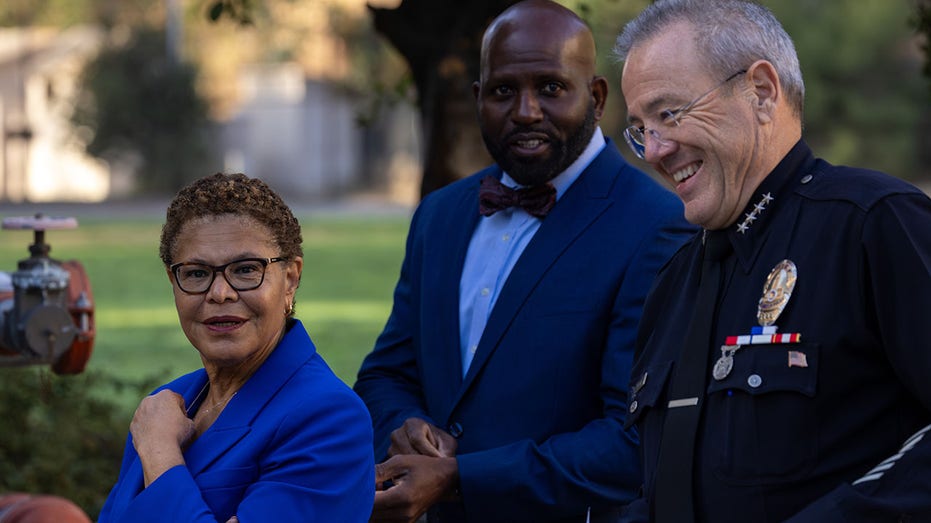
House Republicans passed President Donald Trump's "one big, beautiful bill" on Thursday morning, working through overnight committee meetings, last-minute huddles in the speaker's office and even a last-minute assist from the president.
But while House GOP leadership preached party unity as they passed The One Big Beautiful Bill Act by just one vote, two House Republican holdouts were unwavering in their concerns about the $36 trillion national debt crisis and ultimately voted "no."
Reps. Thomas Massie, R-Ky., and Warren Davidson, R-Ohio, took their concerns to social media on Thursday, telling their constituents exactly why they bucked the Republican Party on Trump's key legislative agenda.
"While I love many things in the bill, promising someone else will cut spending in the future does not cut spending. Deficits do matter and this bill grows them now. The only Congress we can control is the one we’re in. Consequently, I cannot support this big deficit plan. NO," Davidson said early this morning before the vote was final.
MIKE JOHNSON, DONALD TRUMP GET ‘BIG, 'BEAUTIFUL’ WIN AS BUDGET PASSES HOUSE
Massie responded soon after, telling Davidson he agreed and "if we were serious, we’d be cutting spending now, instead of promising to cut spending years from now."
HOUSE GOP LEADERSHIP TAKES VICTORY LAP AFTER PASSING TRUMP'S 'ONE BIG, BEAUTIFUL BILL'
"I’d love to stand here and tell the American people, ‘We can cut your taxes and increase spending and everything is going to be just fine.’ But I can’t do that because I'm here to deliver a dose of reality. This bill dramatically increases deficits in the near-term, but promises our government will be fiscally responsible five years from now. Where have we heard that before?" Massie said on the House floor.
The Kentucky congressman, who regularly sports a national debt clock pin, presented a bleak reality for Trump's "big, beautiful bill" on Thursday as most Republican holdouts rallied behind the final manager's amendment. "This bill is a debt bomb ticking," Massie said.
When White House Press Secretary Karoline Leavitt was asked about Massie and Davidson voting against the bill, she said the president believes they should be primaried.
"I don't think he likes to see grandstanders in Congress. What's the alternative? I would ask those members of Congress. Did they want to see a tax hike? Did they want to see our country go bankrupt? That's the alternative by them trying to vote ‘no.’ The president believes the Republican Party needs to be unified," Leavitt said.
GOP HOLDOUTS UNMOVED BY TRUMP'S 'BIG, BEAUTIFUL' TRIP TO CAPITOL HILL
Massie, who has been campaigning on Trump calling him a grandstander, even fundraised on Leavitt's comments, writing on X, "The big beautiful bill has issues. I chose to vote against it because it’s going to blow up our debt. For voting on principle, I now have the President AND his press Secretary campaigning against me from the White House podium. Can you help me by donating?"
Former Rep. Bob Good, R-Va., who served as Chair of the House Freedom Caucus, has spoken out against the country's debt crisis amid House negotiations, piled on the national debt criticism on Thursday, writing, "The Big Ugly Truth is that the Big Ugly Bill will push the Big Ugly Debt over $60 trillion."
Good found himself out of the job when he lost the Republican primary to now-Rep. John McGuire of Virginia last year.
He was one of just a handful of House Republicans who endorsed Florida Gov. Ron DeSantis in the 2024 GOP presidential primaries, and then Trump threw his political might behind McGuire.
The One Big Beautiful Bill Act is a multi-trillion-dollar piece of legislation that advances Trump's agenda on taxes, immigration, energy, defense and the national debt.
While the bill seeks to make a dent in the national debt crisis by cutting roughly $1.5 trillion in government spending, the United States still has over $36 trillion in debt and has spent $1.05 trillion more than it has collected in fiscal year 2025, according to the Treasury Department.
"I think the most essential truth in American politics is that nobody actually really cares about the national debt or deficit. It’s too abstract to saturate public sentiment," Fox News Digital columnist David Marcus said after the bill passed.
Fox News Digital's Elizabeth Elkind contributed to this report.

CONCORD, N.H. — New Hampshire on Thursday became the first state in New England to ban so-called sanctuary cities.
"There will be no sanctuary cities in New Hampshire, period, end of story," Republican Gov. Kelly Ayotte said at a bill signing ceremony at the state Capitol.
Speaking with Fox News Digital minutes later, Ayotte noted that the measures she signed "ban sanctuary cities in New Hampshire but also allow cooperation between all of our law enforcement and federal immigration authorities."
New Hampshire joins a growing number of states in banning sanctuary cities, which is a term used to describe jurisdictions that put some limits on cooperating with efforts by federal authorities to deport illegal immigrants.
TRUMP SIGNS EXECUTIVE ORDER CRACKING DOWN ON SANCTUARY CITIES
Ayotte, a former state attorney general who later served six years representing New Hampshire in the U.S. Senate, made banning sanctuary cities a key element in her successful 2024 run for governor. Ayotte's campaign slogan was "Don't Mass up New Hampshire," as she took aim at neighboring Massachusetts' more lenient migrant policies.
"I campaigned on making sure we would not have sanctuary cities here in New Hampshire, and we don’t want to go the way of Massachusetts that has had a billion-dollar illegal immigration crisis," the governor said in her national digital exclusive interview with Fox News.
Ayotte noted that she supports "legal immigration, but when people aren’t following our laws, we need to enforce our laws and this is about public safety."
"New Hampshire is ranked the safest state in the nation, and I was glad I was able to sign the bill banning sanctuary cities to make sure we remain that way," the governor added.
HEAD HERE FOR THE LATEST FOX NEWS REPORTING AND COVERAGE OF THE IMMIGRATION ISSUE
The two bills were passed in the GOP-dominated state legislature mostly along party lines.
State Sen. Bill Gannon, the top sponsor in the state Senate, said that the measures would "make us an even safer place to work, live, and raise a family."
And state Rep. Joe Sweeney, the lead House sponsor, said that "we are taking the handfcuffs off our law enforcement officers, and hopefully they’ll be able to work with our federal government, ICE, to put the handcuffs on the criminal illegal aliens that are violating and disobeying our laws."
President Donald Trump repeatedly took aim at sanctuary cities as he made the issue of illegal immigration a key component to his successful 2024 campaign to win back the White House.
And Trump last month signed an executive order putting some muscle behind his threat to pull federal funding from sanctuary cities.
Some Democrats in New Hampshire, who opposed the measure, pointed to Trump's efforts in the nation's capital.
WHAT AYOTTE TOLD FOX NEWS ABOUT SECURITY THE NATION'S NORTHERN BORDER
"What this bill does, under the guise of enabling New Hampshire law enforcement to support federal immigration efforts, is to make our state a willing accomplice in a politically manufactured campaign of state terrorism against a group of people, the vast majority of whom came here not to victimize America, but because they love America and they believe America is good," state Rep. David Meuse told reporters.
But Ayotte, asked about the lack of support from across the political aisle for the two bills, said, "I don’t understand where the Democrats are on these policies."
CLICK HERE TO GET THE FOX NEWS APP
According to the New Hampshire Municipal Association, there are no sanctuary cities in the state, while a handful of cities and towns in the state have described themselves as "welcoming cities" that encourage a welcoming environment for all people, regardless of their race, ethnicity or origin.
But state Republican lawmakers pointed to between nine and 12 cities and towns in New Hampshire that they have identified over the years as welcome or sanctuary cities.
